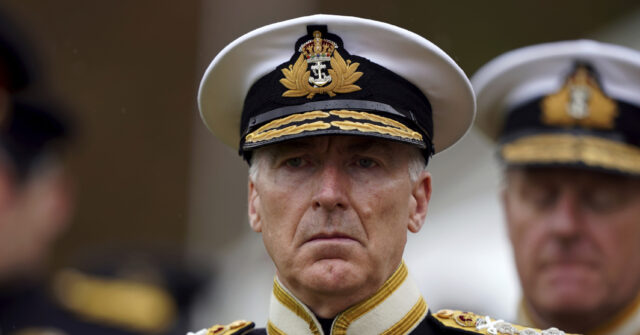Admiral Sir Tony Radakin, the Chief of the Defence Staff of the British Armed Forces, has recently articulated a concerning evaluation of the evolving global security landscape, proclaiming that the world is entering a perilous third nuclear age. This age, according to Radakin, is distinguished from its predecessors by a disregard for the historical principles of deterrence and the containment of uncontrollable escalation. During a speech at the Royal United Services Institute, amidst a gathering of influential defense figures, the Admiral posited that the current security environment is more contested and dangerous than previous eras, raising alarm about the implications for the United Kingdom and its allies.
Tracing the chronological shifts in nuclear security, Radakin recounted the two earlier nuclear ages. The first, characterized by Cold War tensions, relied heavily on the mutual understanding between nuclear powers that any escalation could lead to catastrophic consequences. This period, while fraught with danger, upheld mechanisms of deterrence that constricted nations to take their international responsibilities seriously. The second nuclear age emerged in the post-Cold War period, emphasizing disarmament efforts and counter-proliferation strategies, which were viewed as overarching successes in maintaining international security. Radakin acknowledged these successes, yet he asserted that recent developments, particularly spearheaded by Russia under President Putin, signal an alarming regression to a more aggressive and unpredictable nuclear posture.
Radakin underscored the threats posed by Russia, particularly its provocative behaviors, including tactical nuclear threats and military maneuvers against NATO. He posited that Putin’s actions are driven by a distorted historical narrative, contributing to this risky new nuclear reality. Additionally, the Admiral highlighted the expanding nuclear capabilities of China, Iran, and North Korea, labeling these nations as authoritarian entities opposed to responsible governance. This geopolitical landscape is compounded by a third category of nations that flirt between cooperation and contention for opportunistic gain. Collectively, these developments create a dangerous milieu that challenges the established norms of international relations and defense.
Speaking from the perspective of the United Kingdom’s defense strategy, Admiral Radakin emphasized a dual approach: acknowledging the stark threats while simultaneously reinforcing the strengths of NATO and its allies. He pointed out that NATO countries outspend both Russia and China combined, and that Europe and the United States together account for a significant portion of global wealth. However, the UK, while geographically insulated from direct aggression, faces tangible repercussions from geopolitical instability, particularly as the fallout from Russia’s military actions in Ukraine affects energy prices and overall national security. Radakin elucidated how increased cyberattacks and disruptions to critical infrastructure are manifestations of this instability, reminding his audience that the impacts of a volatile world extend beyond military strategy to everyday life.
The Admiral’s insights also reflect an urgent need for a reassessment of defense priorities amidst a backdrop of rising global tensions. He expressed a sense of duty to prepare the nation for potential tragedies stemming from escalating threats, defining deterrence as a still critical element of the UK’s military ethos. In anticipation of a significant shift in the UK’s defense posture, with considerations for military expenditure looming under a new left-leaning government, he urged the need for a realistic appraisal of the risks at hand. While acknowledging the daunting landscape, Radakin’s rhetoric aimed to balance alarm with pragmatism, focusing on the necessity of maintaining resolve against escalating threats.
The discussion around defense readiness echoes broader sentiments shared among European nations, particularly those closest to the Russian flank such as Poland. Polish officials have voiced concerns about an imminent need for NATO to bolster its military capabilities quickly to deter potential Russian advances. The urgency expressed by Polish leaders and experts mirrors Radakin’s assessment and highlights a collective acknowledgment among European allies of the need for heightened preparedness. Amidst voices advocating for increased military spending, there is a growing conversation about the implications of European reliance on American defense, and the potential unsustainability of current lifestyles if defense readiness is to be prioritized.
Ultimately, Admiral Radakin’s assertions encapsulate a critical moment in global maritime and defense strategy, where the specter of nuclear confrontation looms larger than in decades past. As nations grapple with the evolving tactical landscape, the ongoing discourse reflects a pressing need for both vigilance and adaptability in response to the geopolitical shifts that define this new nuclear age. The Admiral’s narrative is a wake-up call for the UK and its allies, prompting a reassessment of defense priorities and a reinvigoration of the commitment to deterrence and collective security in an increasingly unpredictable world.

